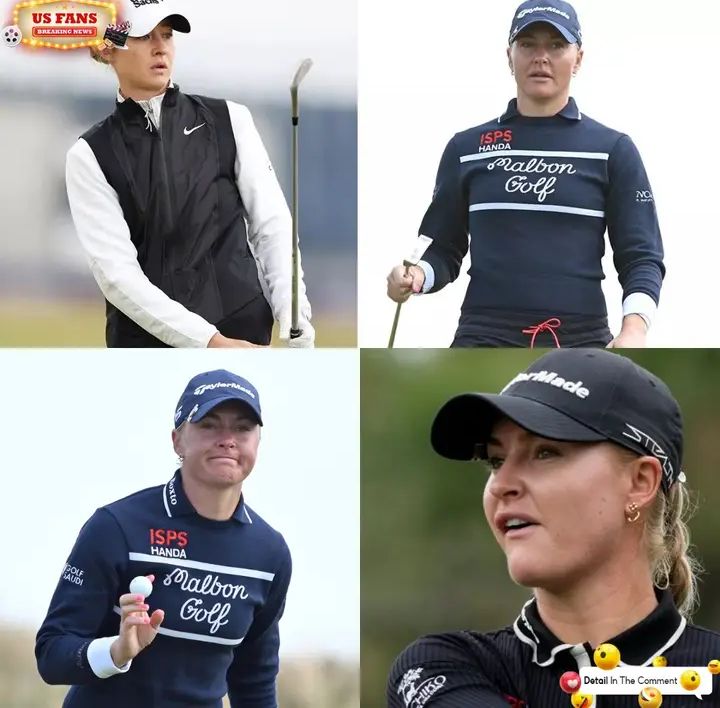She swung the club around like a monkey.

Recently, Charley Hull – a prominent personality in the world of women’s golf gained attention for her strong, albeit controversial views on fellow player Nelly Korda following their encounter at Women’s Open. Their friction became evident as Hull expressed disapproval towards Korda’s performance and style choices through language that could be perceived by some as unyielding and not fitting within professional conduct codes.
When Hull compared Korda to a monkey swinging a club, she not only criticized her approach but also ignited passionate debates in and beyond the golfing community. The language was forceful, reflecting Hull’s frustration with Korda’s performance during their match. As someone known for being competitive and outspoken, such comments from Hull were not out of character; however, the particular phrasing used evoked diverse reactions – some supportive while others critical.
There are several ways to interpret Hull’s description. Firstly, it could be seen as a criticism of Korda’s technique, insinuating that her swing lacked the finesse and precision typically expected from top-level golfers. Drawing a comparison with “a monkey swinging a club” suggests that Hull perceived Korda’s approach as uncontrolled or lacking strategic thinking – qualities often valued in professional golf circles. This critique may appeal particularly to those who prioritize technical skill and refined techniques over raw power or instinct. They would view golf more as a game requiring calculation rather than brute force.
Alternatively, Hull’s wording could be interpreted as an outlet for her personal annoyances and potential rivalry with Korda. The phrasing carries a notable weight, compounded by utilizing animalistic imagery that provokes contemplation regarding respect and fair play within athletics.
Throughout its lengthy history, golf has witnessed numerous instances of players displaying their emotions in manners that occasionally transgress accepted norms. Hull’s remark could be interpreted as an indication of the immense stress and passion associated with competing on the grandest stage. As a major tournament, The Women’s Open entails considerable risks, frequently resulting in athletes exhibiting behaviors atypical to their usual conduct while venting out irritations or disappointments they face during gameplay.
After Hull made her comment, the golf community quickly responded. Many individuals within the sport defended Hull’s words, claiming that sports are inherently competitive and allow for emotional expression – even if it involves controversial or blunt comments. For these supporters of Hull’s perspective, her statement was a natural reflection of both her desire to win and highly-competitive nature – an approach often used as part of psychological gamesmanship during intensely high-stakes matches where players seek all possible advantages including verbal jabs.
However, some were swift to rebuke Hull for her remark which they felt overstepped boundaries of decency and professionalism. They contended that golf is a sport that prides itself on manners and fair play, with Hull’s comment deemed detrimental to those values. Specifically, the comparison she made took offense as it was perceived as inappropriate and insulting; in fact some believed this implied Korda having an inferiority complex thus disregarding her accomplishment or capability as golfer. Opponents could contend against Hull’s statement arguing although competitions may elicit strong feelings from players yet nonetheless respect towards foes ought to be upheld regardless of winning or losing games.
The incident highlighted the larger concerns regarding how female athletes are evaluated and judged in the sports arena. Comparable to male golfers, female players face close inspection not only for their skills but also for their conduct and emotional display while playing. The remark made by Hull contributes toward an ongoing dialogue about the challenges encountered by women sportspersons as they balance between exhibiting competitiveness and conforming with professional decorum demands.
Following Hull’s statement, conversations about sportsmanship, the importance of respect in games and how emotions affect competition are expected to persist. It remains uncertain whether her comments will have any lasting effect on her career or relationship with Korda; however, it is undeniable that this event has prompted a broader discussion regarding the essence of contests and athlete expressions during moments under tension.

